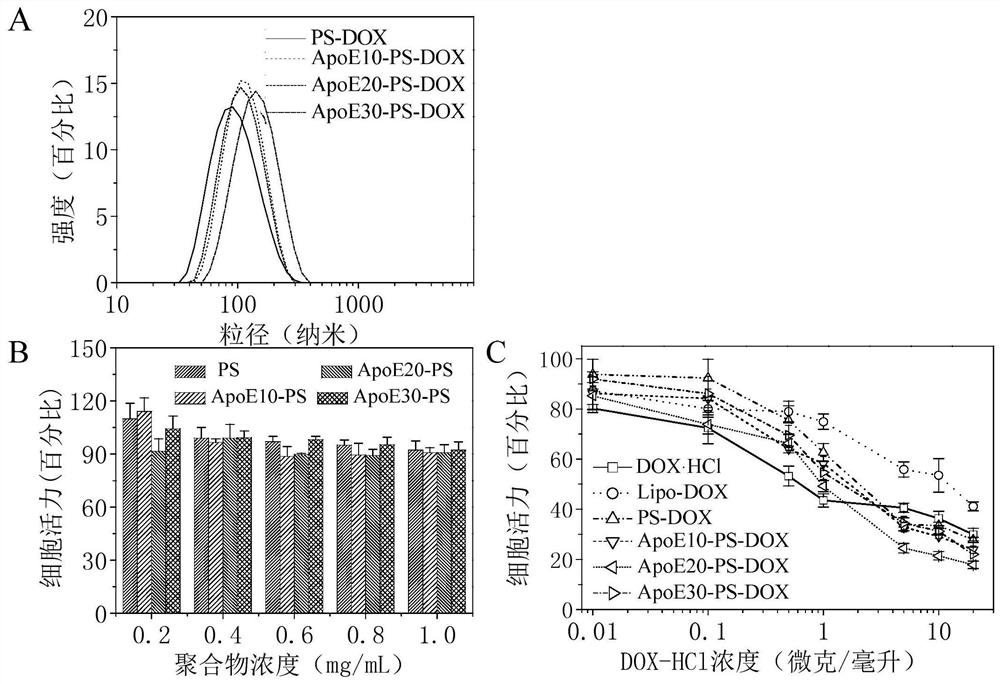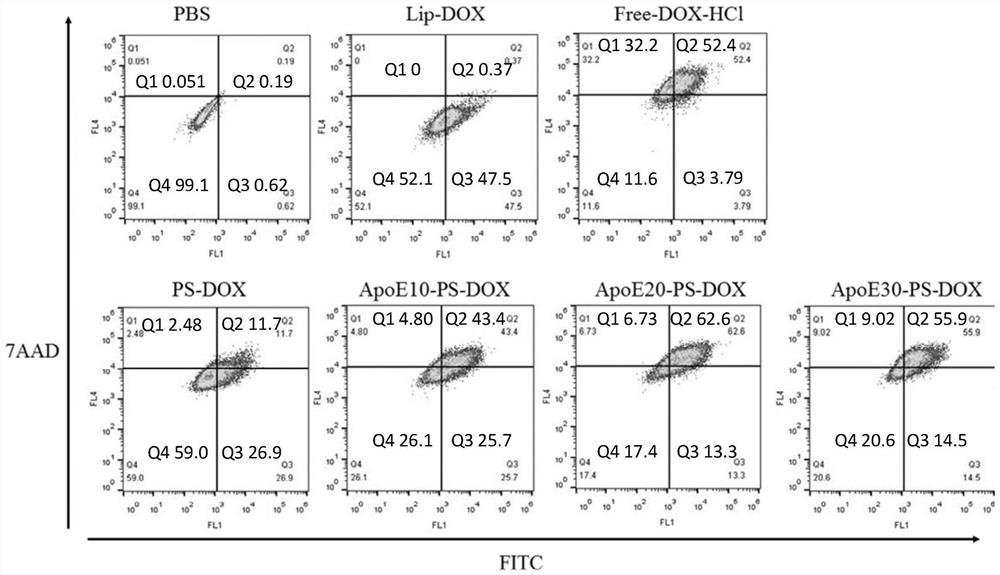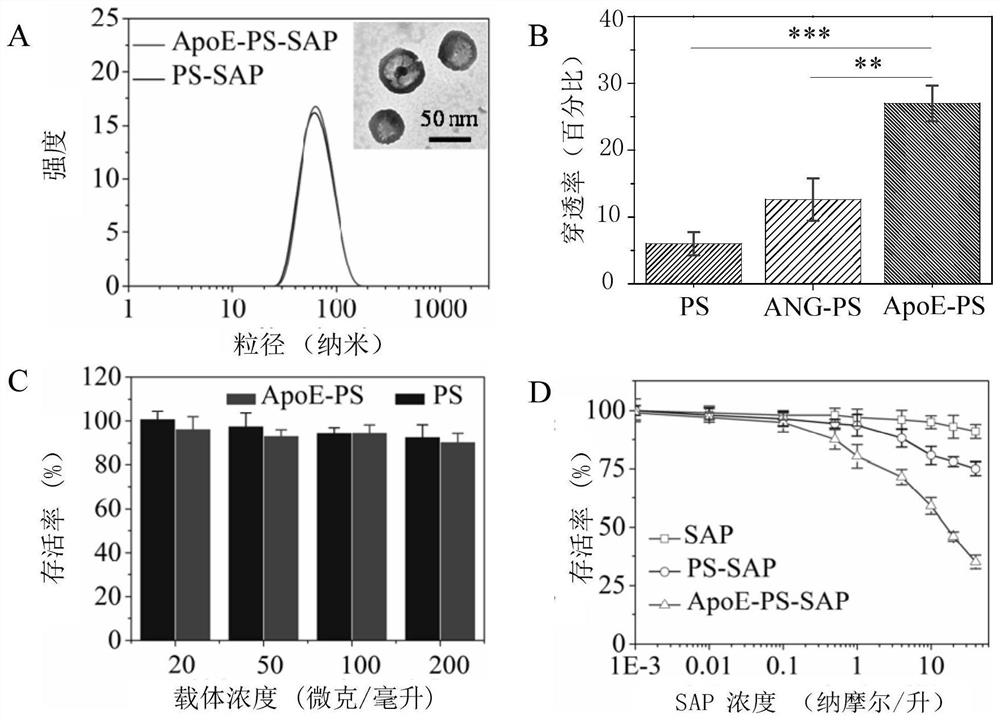Application of a single-targeted reduction-responsive vesicle nanomedicine in the preparation of brain tumor therapeutic drugs
A technology of nano-drugs and therapeutic drugs, which is applied in anti-tumor drugs, drug combinations, and pharmaceutical formulations. The effects of increased drug release rate, better brain tumor cell and biosafety, and higher drug activity
- Summary
- Abstract
- Description
- Claims
- Application Information
AI Technical Summary
Problems solved by technology
Method used
Image
Examples
Embodiment 1
[0052] Example 1 Synthesis of PEG5k-P (DTC4.4k-LA19.8k) and ApoE-PEG7.5k-P (DTC 4.4k-LA19.8k) block copolymer
[0053] In a nitrogen glove box, weigh MeO-PEG-OH ( M n = 5.0 kg / mol, 0.50 g, 100 μmol), LA (2.0 g, 13.9 mmol) and DTC (0.50 g, 2.60 mmol) were dissolved in dichloromethane (DCM, 7.0 mL), and the catalyst diphenyl phosphate was added with stirring (DPP, DPP / OH molar ratio is 10 / 1). The airtight reactor was sealed and placed in an oil bath at 40° C. for 2 days under magnetic stirring. Triethylamine terminated the reaction, precipitated twice in glacial ether, filtered with suction, and dried under vacuum at room temperature to obtain PEG5k-P (DTC4.4k-LA19.8k).
[0054] The synthesis of ApoE-PEG7.5k-P (DTC4.4k-LA19.8k) is divided into two steps, the first step is similar to the synthesis of PEG5k-P (DTC4.4k-LA19.8k), using Mal-PEG-OH (Mn =7.5 kg / mol) instead of MeO-PEG-OH ( M n = 5.0 kg / mol) initiated the ring-opening polymerization of DTC and LA to obtain Mal-P...
Embodiment 2
[0055] Example 2 Synthesis of block copolymers PEG5k-P (DTC2k-TMC15k) and PEG5k-P (DTC2k-TMC15k)-bPEI1.8k
[0056] In a nitrogen glove box, weigh MeO-PEG-OH ( M n = 5.0 kg / mol, 0.50 g, 100 μmol), TMC (1.52 g, 14.55 mmol) and DTC (0.23 g, 1.18 mmol) were dissolved in dichloromethane (DCM, 7.0 mL), and the catalyst diphenyl phosphate was added with stirring (DPP, DPP / OH molar ratio is 10 / 1). The airtight reactor was sealed and placed in an oil bath at 40° C. for 2 days under magnetic stirring. Terminate with triethylamine, precipitate twice in glacial ether, filter with suction, and dry in vacuum to obtain PEG5k-P (DTC2k-TMC15k).
[0057] PEG5k-P (DTC2k-TMC15k) is prepared by NPC activation of the terminal hydroxyl chloroformate p-nitrophenyl, and then reacting with the primary amine of branched PEI (bPEI). Specifically, PEG5k-P(DTC2k-TMC15k) (0.4 g, hydroxyl 0.017 mmol) and NPC (50 mg, 0.09 mmol) were dissolved in dry DCM and reacted at 0°C for 24 hours, then precipitated ...
Embodiment 3
[0059] Example 3 Synthesis of Targeted Copolymer
[0060] Targeting polymers can be synthesized in various ways, depending on the terminal functionalization groups of PEG. ANG-PEG7.5k-P(DTC2k-TMC15k) was synthesized in two steps. The first step is similar to the synthesis of PEG5k-P (DTC2k-TMC15k) in Example 1, but with Mal-PEG-OH (Mn=7.5 kg / mol) instead of MeO-PEG-OH ( M n = 5.0 kg / mol) as the initiator to initiate the ring-opening polymerization of DTC and TMC to obtain Mal-PEG7.5k-P (DTC2k-TMC15k). In the second step, the Michael addition reaction occurs between the latter and the sulfhydryl group of the polypeptide ApoE in a molar ratio of 1:1.2. Add the DMSO solution of the targeting polypeptide ApoE dropwise to the DMSO solution of Mal-PEG7.5k-P (DTC2k-TMC15k) under nitrogen gas, stir and react at 37 degrees for 8 hours, then dialyze in DMSO for 24 hours and then dialyze with secondary water At 12 o'clock, the product ApoE-PEG7.5k-P (DTC2k-TMC15k) was obtained by ly...
PUM
| Property | Measurement | Unit |
|---|---|---|
| molecular weight | aaaaa | aaaaa |
| molecular weight | aaaaa | aaaaa |
| particle diameter | aaaaa | aaaaa |
Abstract
Description
Claims
Application Information
 Login to View More
Login to View More - R&D
- Intellectual Property
- Life Sciences
- Materials
- Tech Scout
- Unparalleled Data Quality
- Higher Quality Content
- 60% Fewer Hallucinations
Browse by: Latest US Patents, China's latest patents, Technical Efficacy Thesaurus, Application Domain, Technology Topic, Popular Technical Reports.
© 2025 PatSnap. All rights reserved.Legal|Privacy policy|Modern Slavery Act Transparency Statement|Sitemap|About US| Contact US: help@patsnap.com



